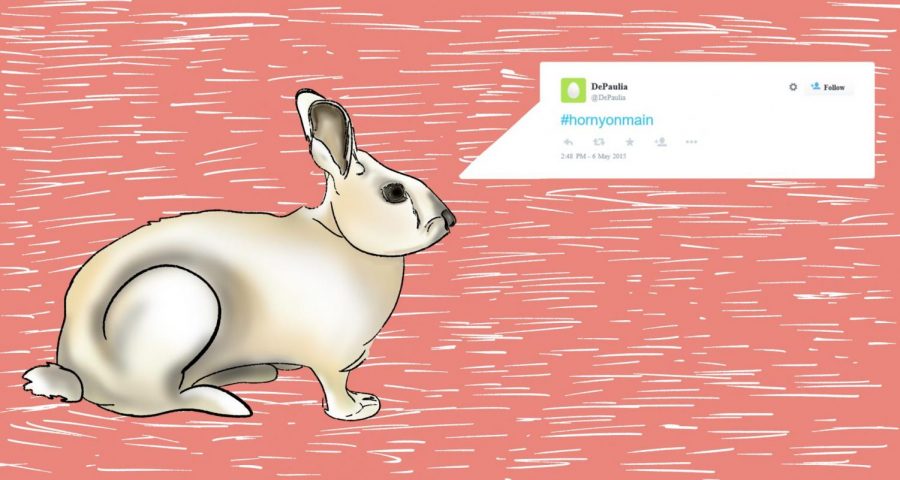The rise of horny posting
What is it about a global pandemic that makes everyone horny?
A week after the stay at home orders were put in place, Twitter timelines everywhere were flooded with tweets about wanting some. Most of those tweets were from yours truly.
Twitter is a horny domain to begin with. With fewer restrictions than Instagram on what you can show, it’s not uncommon to come across some nudity every once in a while, depending on who you’re following or who you’re following is following, that is. Plus, people aren’t afraid to tweet exactly what’s on their minds. You’re allowed to be depressed on Twitter. On Instagram, you have to put a filter over everything.
The world has faced many crises, but nothing like an outbreak that demands people stay at home and not touch each other. The minute those rules were put in place, everyone wanted to break them and thus horniness surged.
Between April 12-18, 2020, Google Trends, a server that analyzes top search queries in Google Search over time and across various regions, shows a score of 100 — the highest score a term can receive — for the phrase “horny on main.”
According to Know Your Meme, a website that researches and documents internet memes and viral phenomena, “horny on main” is used to describe the practice of posting and engaging with sexually charged posts on one’s main social media account as opposed to an account created solely for that purpose.
The phrase first rose to relevance in 2016 on Tumblr within the furry community. It then made its way to Twitter after Texas Senator Ted Cruz ‘liked’ a pornographic tweet, catching the attention of everyone and perfectly capturing the consequences of being horny in public.
However, if you’re not a U.S. Senator, there is no harm in being horny on main. I mean sure, your friends might roast you for it, but expressing sexual desires or frustrations is funny and often relatable. Also, nothing matters anymore in the time of COVID-19, so go for it.
Communicating your thirstiness through words is one thing. It’s an entirely other thing to post nude, semi-nude or even suggestive pictures on social media.
At the start of quarantine, I was feeling particularly good one morning and decided to have a self-timer assisted photoshoot in my kitchen. I put on my favorite bra and the closest matching underwear I could find and got cooking (pun intended).
Looking at the photos afterwards, I loved the results. My body looked strong and real, and I felt empowered because of that.
I planned on just keeping them for myself. Then, I jokingly tweeted, “catch me day 14 of quarantine posting my nudes on main.” Day 14 came, and I kept my promise.
At first, I was nervous. What if an employer were to see them? My family members follow me. What would they think? But after looking at them on my grid and reading supportive (and hilarious) comments from my best friends, I felt emboldened by the entire experience. I wasn’t doing it for attention, and my followers and friends alike knew that. I was doing it because I felt good and wanted to share my sentiment.
On the topic of feeling good and horniness, May is National Masturbation Month. What was once just a day (May 28 to be exact) has now expanded to an entire month.
Dating back to 1995, National Masturbation Month started after San Francisco-based sex-positive retailer Good Vibrations declared the day in honor of Surgeon General Joycelyn Elders. Elders was fired in 1994 by President Bill Clinton for suggesting masturbation be included in the sex education curriculum for students. The founders of Good Vibrations wanted to acknowledge Elders’ unfair firing as well as invite people to talk about masturbation. Consequently, National Masturbation Month arrived and is celebrated as such.
In a world where sexual health is an increasingly important issue masturbation (and talking about it) is important for several reasons. Jenn Gunsaullus is the author of the book “From Madness to Mindfulness: Reinventing Sex for Women.” She is also a sociologist, sexologist, intimacy coach and frequent public speaker. Gunsaullus’s approach to all things sex is through the lens of mindfulness and compassion, two things imperative during times of stress.
“[Masturbation Month] is a great reason, especially for young women, to normalize talking about pleasure and self-pleasure, and give women the permission to explore it,” Gunsaullus said over the phone.
Masturbation can look like a lot of different things, Gunsaullus explained. For those who feel embarrassment toward it, Gunsaullus invites you to try to change your mindset.
“Masturbation can be looking at porn for five minutes and knocking one out,” Gunsaullus said. “Or, it could be this meditative, mindful masturbation, which is this whole self-nurturing experience of anchoring into your five senses. This can be particularly important for folks who have sexual shame of their genitals.”
Gunsaullus teaches people that masturbation is okay, that you’re worth taking the time to slow down and get to know your body and cultivate sexual awareness. Knowledge of what’s going on inside of you brings empowerment.
Searah Deysach, owner of Early to Bed, an adult toy store located in Andersonville, noted how the pandemic is the perfect opportunity to enjoy masturbating more.
“[Masturbating] is a super safe way to enjoy your body, get to know what turns you on sexually, engage in stress release and just experience pleasure, which is our birthright,” Deysach said.
Right now, staying healthy is at the top of people’s minds. People are washing their hands like it’s this new, trendy thing to do, while others are propping up their phones and doing workout videos. However, one way to stay healthy that is often overlooked is masturbation.
Both Deysach and Gunsaullusmentioned how masturbating can be a great stress reducer.
“You get a flood of positive neurochemicals to the brain that feel good,” Gunsaullus said. “Anything that reduces stress, reduces cortisol levels, which alleviates you being in fight or flight mode with your body. Overall, that will improve your bodies functioning and therefore your immune system.”
Emily Powers and Sophia Marinelli, recent graduates of Parsons School of Design, are the hosts and producers of the podcast “Just FYI.” About a year ago, the duo decided that they were tired of Googling questions pertaining to health, sex and dating only to come up with misleading and often unrealistic answers.
“Our whole angle is ‘unconventional sex ed’,” Powers said. “We wanted to create a discourse around topics that your typical health class didn’t cover.”
Podcast episodes range from talking about what it’s like to be a sugar baby to dating during the pandemic.
“I think there needs to be more openness when talking about sexual health and wellness,” Powers said. “The fact that there are still taboos [around it] is troubling to me.”
So, what are you waiting for? Slip into something comfy, tell the timeline about it and indulge in self-pleasure.














